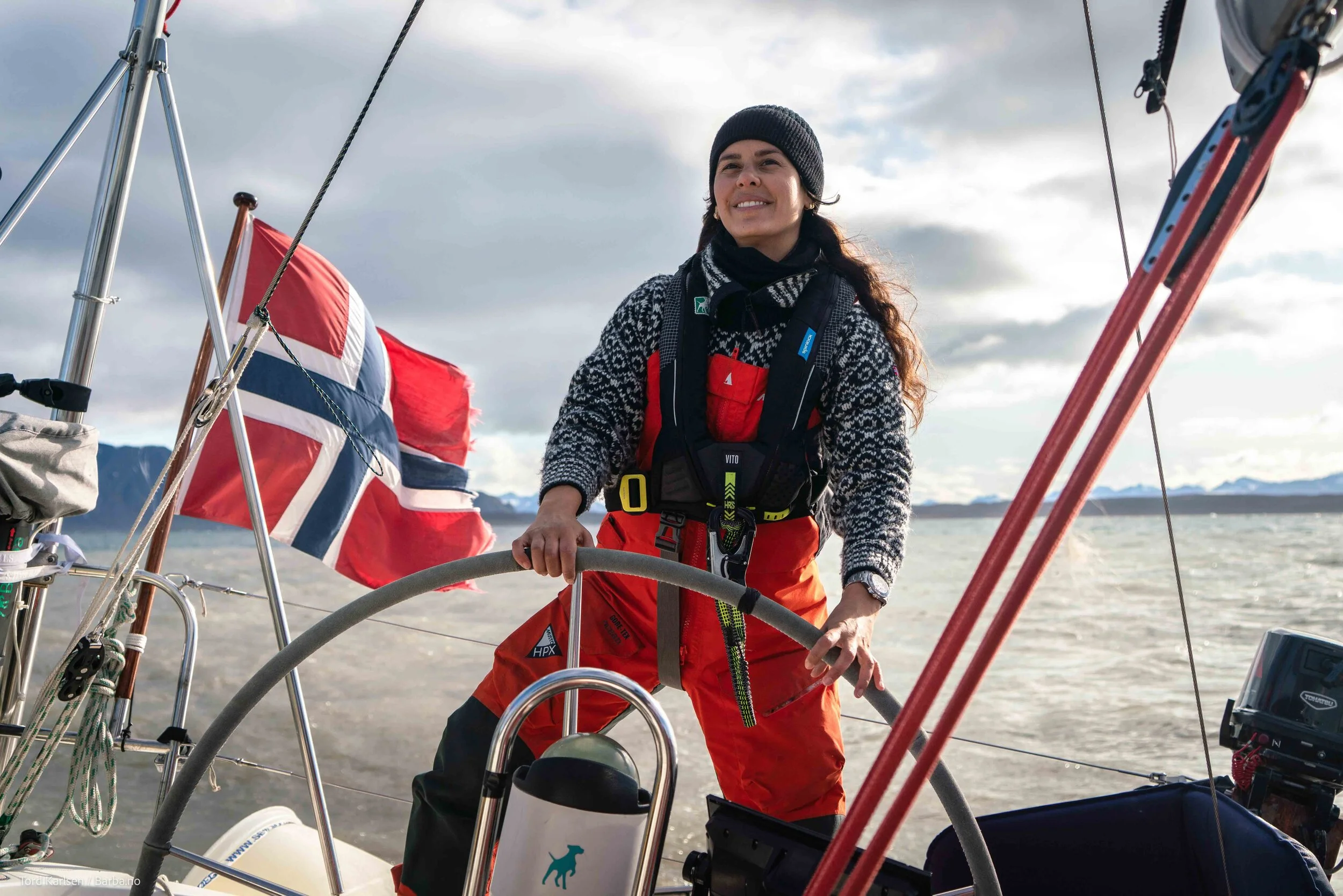I’m Arzucan Askin!
Arzucan at the helm of a ship. Photo by Tord Karlsen.
I'm Arzucan Askin (also known as "Zuzu" among colleagues and friends) and I am an interdisciplinary conservation scientist and graduate student at the University of Oxford where my research focuses on the impacts of human activities on the behaviour of marine megafauna. Just a few weeks ago I had the incredible opportunity to join Captain Andreas B Heide and his crew for a circumnavigation of Svalbard onboard his sailing vessel Barba as part of the 2021 Arctic Sense Mission. The expedition was a dream come true, not only because it took us to 80 degrees 32 minutes North, and because we were lucky enough to have intimate encounters with blue whales and polar bears, but also because I got to dive under ice and for the first time. I will never forget the first time I looked up from below the surface, my hands and feet shivering inside my drysuit, and saw sea ice resembling white clouds above me.
Arzucan peers from the edge of a ship to the ocean below. Photo by Tord Karlsen.
Similar to everyone in the Polar Impact Community, my love for the frozen landscapes of our beautiful planet also has very unconventional origins. I grew up in Berlin as the child of Turkish immigrants that came to Germany two decades after WWII in the hope of building a new and better life in Europe. I was always a very adventurous child with a never ending curiosity for the unknown. When I was little, I loved climbing on trees to read books amidst the branches, drawing maps of places I wished to explore in the future and playing in seagrass meadows underwater. What I could never get enough of were the stories of ocean explorers - from the Ancient Greeks that sailed the Mediterranean sea, to Polynesian seafarers that navigated across large distances between island nations in the Pacific, to the Vikings and their voyages from Scandinavia to Greenland, I was captivated by the craft and skill required to undertake these challenging journeys powered by the wind. I dreamt of one day exploring remote corners of the world in a sailboat one day and found myself inevitably pulled to the polar regions.
During my undergraduate studies in human geography, I interned at the Royal Geographical Society with the Institute of British Geographers (RGS-IBG). There, I came across photos from Shackleton's expeditions to Antarctica and was mesmerised by the images of an old sailing vessel surrounded by ice, consequently spending weeks in the the archives to examine old maps and records, while imagining what it would be like to sail "at the end of the world" in a contemporary context. It wasn't until I heard about Skip Novak's expeditions to Antarctica and Captain Andreas B Heide’s work in the Arctic North, that polar exploration and science became more tangible for me, while also still presenting barriers as women from minority ethnic backgrounds are missing entirely in the documented history of polar maritime exploration.
Initially, turning my interest in the polar regions into action, seemed a little impossible to my family and friends - after all, nobody from our community had ever gone to the Arctic or the Antarctic - neither as a worker, nor as a researcher.
While some of my loved ones were very supportive of my endeavours, others were sometimes also quite discouraging as they did not believe it would be possible for someone with our background to do the things I dreamt of doing and they wanted to protect me from disappointment. My mom and brother, as well as my best friends from Berlin have always had my back and whenever I have doubted myself, they reminded me that “if you dream it, you can do it”.
Being a diver, my happy place is underwater. The ocean is more than just the place I feel most at home or world’s largest and most important ecosystem, it is also a playing field for power and strong policy mechanisms are a fundamentally vital response to increasingly inequitable suffering of people and wildlife under the consequences of failing governance - especially in the Arctic, as evident by the current geopolitical tensions. The issues our global oceans, and particularly Arctic waters, are facing are the result of human decisions that are made on land. Collectively, we need to make better decisions. In the future I hope to contribute to tangible and impactful solutions for the conservation of (polar) marine ecosystems through research, storytelling and science communication. The underwater world - particularly in the polar regions - is a highly inaccessible environment for most people. As a diver and sailor I am not only immensely privileged to visit and work in these places, but also feel that I have the responsibility to capture and bring back stories for those who might not have these opportunities.
Standing on the sea ice. Photo by Tord Karlsen.
I am particularly passionate about better understanding how humans impact marine ecosystems and marine megafauna. My dream would be to work more on untangling the impact of noise pollution on Arctic whale species, to shoot documentaries underwater from a boat powered by the wind and the sun, and to participate in the drafting process of new international treaties for the protection of the Arctic seas.
The advice I would give to someone who wants to take the same career path as I is actually to not take the same career path, but to create their own!
We all come from different places, different cultures, different education systems, so why go down the same route or spend energy trying to copy someone else’s footsteps.
Different roads can lead to the same destination, and oftentimes it is very rewarding to not follow the convention and creatively find new points of entry into the work and field. To me, diversity in polar exploration and science does not only mean ethnic diversity, but also diversity in thoughts and practices. The polar regions need all disciplinary backgrounds and skill sets and there are many opportunities beyond the field of climate science. We need lawyers, economists, historians, artists, political scientists, conservationists and many more to work in polar regions!
Arzucan Askin can be found at arzucan-askin.com, @arzucan_askin on Instagram, and @arzucan_askin on Twitter.








